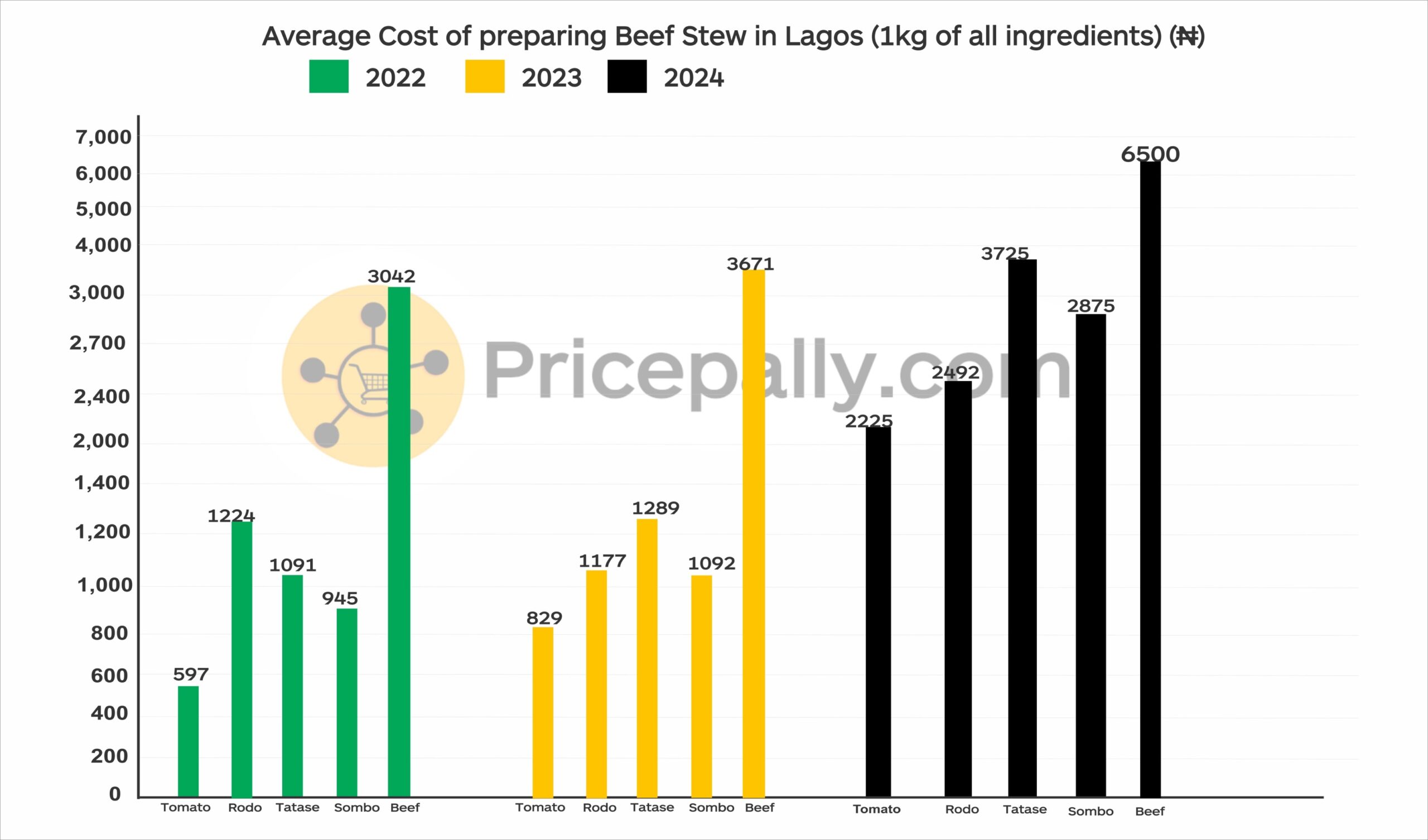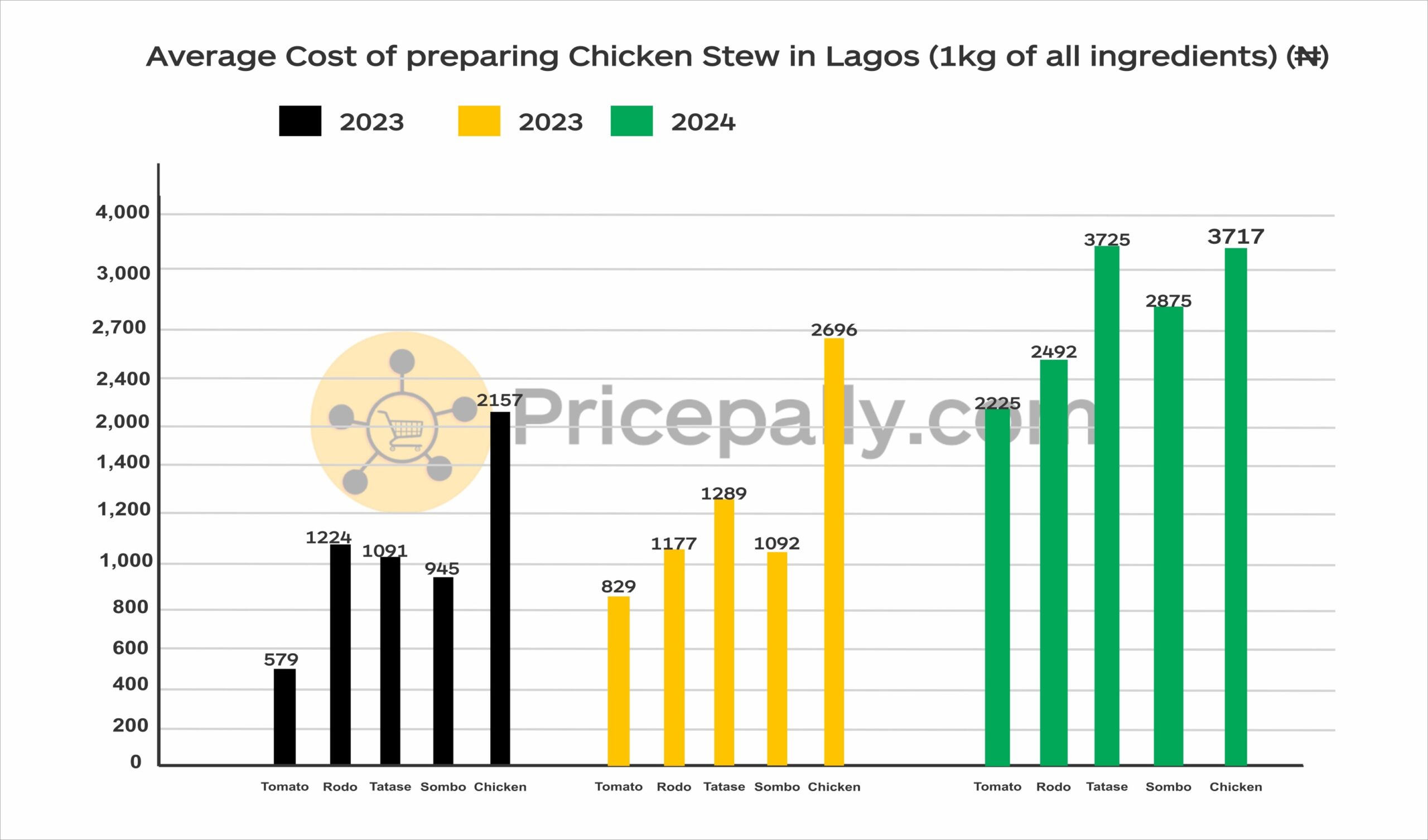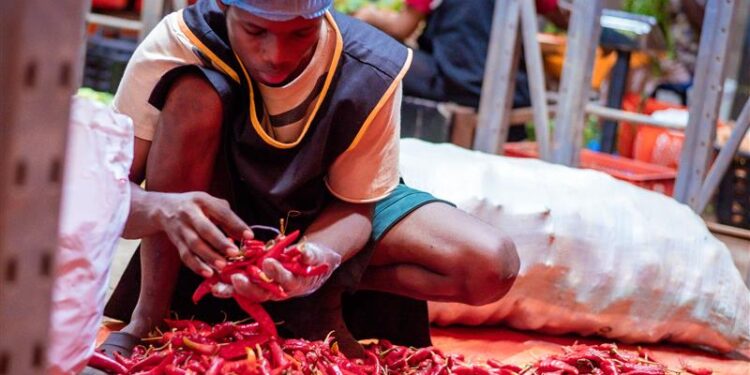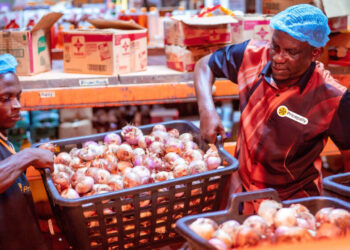The cost of preparing beef stew in Lagos rose from ₦6,902 in 2022 to ₦8,060 in 2023 (a 16.77% increase) and surged 121% to ₦17,817 in 2024.
In 2023, a minimum wage earner needed 106% of their salary to cook stew weekly for a month.
By July 2024, they’d need 25.45% of the new ₦70,000 minimum wage or 59.39% of the old ₦33,000 wage for just one pot.”
PricePally, a leading online grocery store in Nigeria, has released the 2024 edition of its Stew Index Report, an annual analysis of food price trends that provides insights into the country’s food security challenges.
The latest report provides a detailed analysis of the cost of preparing a pot of Nigerian tomato stew, a staple dish, in Lagos.
The report tracks the prices of key ingredients, such as tomatoes, peppers, onions, and protein sources, offering insights into how food inflation impacts household expenses.
According to the latest findings, the average cost of making a standard pot of tomato stew for a family of six in Lagos has increased significantly. Between 2023 and 2024, the average cost of making a pot of stew more than doubled across all protein types.
Beef stew, a staple in Nigerian homes, surged from ₦8060 in 2023 to ₦17,817 in September 2024, reflecting a staggering 121.05% increase.
The cost of preparing a pot of chicken stew in Lagos increased by ₦7085 in 2023 to ₦15034 in 2024. Similarly, the cost of preparing turkey stew and goat meat stew increased from ₦7966 and ₦8227, respectively, in 2023 to ₦17987 and ₦20817, respectively, in 2024. Staples like onions and pepper saw significant price jumps, affecting households and vendors alike.
Lagos was chosen as the focus of this report due to its position as Nigeria’s economic hub, where price fluctuations have a direct impact on millions of residents. As one of the country’s largest consumer markets, Lagos reflects broader economic trends and the realities faced by urban households.
Given the high reliance on informal food markets and varying supply chain challenges, the city provides a clear picture of how inflation affects food accessibility and affordability.
The PricePally Stew Index Report aims to create awareness around food price trends, helping consumers, policymakers, and industry stakeholders understand the dynamics of food inflation. By monitoring these changes, the report highlights the need for more sustainable food supply solutions and cost-saving measures for Nigerian households.
Beyond its analysis of numbers, the 2024 PricePally Stew Index Report underscores the growing disconnect between policy measures and the lived experiences of Nigerians. Rising hunger rates and increasing stunting in children under five highlight the broader implications of food inflation on food security.

Addressing the findings in the report, Luther Lawoyin, CEO of PricePally, noted, “The sharp rise in stew preparation costs is more than just a statistic—it’s a reflection of the economic strain on Nigerian households. At PricePally, we see firsthand how food inflation erodes purchasing power, making everyday meals a luxury for many.
“The 2024 PricePally Stew Index Report is our way of documenting these challenges, advocating for better food systems, and driving solutions that make nutritious meals more accessible and affordable for all.”

PricePally remains committed to making food more affordable and accessible for Nigerian households. PricePally recently launched the PricePally Loyalty Rewards, an initiative that lets customers earn up to ₦50,000 worth of groceries when they shop on PricePally. You can join the league of earners and save money by using the discount code “SAVESTEW” when shopping on the platform.
PricePally also fosters direct partnerships with farmers and wholesalers to reduce supply chain inefficiencies, ensuring fresh and fairly priced produce. In October 2024, PricePally empowered over 160 farmers through the Good Agricultural Practices (GAP) training.
Speaking of this training, Benjamin Ogunbola, GSMA Project Manager at PricePally, noted, “Our farmers are at the core of PricePally’s mission to make quality food accessible to everyone. By equipping them with the knowledge to grow, harvest, and distribute their produce effectively, we’re not only supporting their livelihoods but also improving food availability and affordability across communities.”
Beyond education, PricePally supports business growth for farmers by providing direct access to ready consumers while ensuring fair pricing. This approach has enhanced scalability and profitability, as farmers recently shared their experiences of working with PricePally.
Through these initiatives, the company continues to support families navigating rising food costs while promoting a more sustainable and efficient food distribution system.
About PricePally
PricePally is an online grocery platform dedicated to providing affordable farm-fresh food and household supplies. Operating in Lagos, Ibadan, Abuja, and Port Harcourt, the company’s mission is to ensure accessible and efficient food supply chains for Nigerians.
Through initiatives like the Good Agricultural Practices program and the Seeds of Sustainability project, PricePally continues to drive innovation in Nigeria’s food sector.


















